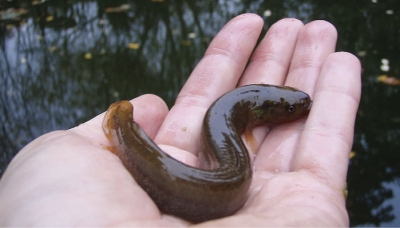Versatile mudfish underrated
Most New Zealanders are unaware of the existence of this little known but special species of fish, let alone seen one. If you were to cross an eel with a whitebait – this is what the Canterbury mudfish looks like.
Small, tubular and lacking scales, the adults are 10 to 12cm long, generally nocturnal and are restricted to small isolated freshwater locations, so are seldom seen. The juveniles feed during the day, hiding at night to avoid being eaten by their adult counterparts.
Mudfish may appear unspectacular, but they have some very special characteristics and they are part of our treasured taonga.
To allow them to survive in periods of drought, mudfish bury themselves in damp surroundings such as under logs, tree roots or vegetation to wait for surface water to return. By slowing down their metabolic rate and breathing oxygen through their skin, mudfish can survive up to two months out of water!
There are five species of mudfish and all are classified as either threatened or at risk under the New Zealand Threat Classification with the most threatened being the Canterbury mudfish.
At the Isaac Conservation and Wildlife Trust in Christchurch, a focus to increase numbers of Canterbury mudfish is being achieved by optimising their pond environment to promote their establishment, removing predator fish species such as eels, trout and salmon and working closely with DOC to monitor and study this endangered species.
A threat to all species of mudfish across New Zealand is the depletion of habitat by the draining of swamps, wetlands and the modification of waterways and drains through mechanical clearance.
Simple mudfish habitat protection can be achieved through:
- Fencing off the wetland from stock to prevent wetland plants being grazed and trampled.
- Plant a native vegetation buffer and DOC can recommend suitable plants for riparian planting.
- Prevent invasive fish species establishing by finding out which species are in your catchment and taking care not to accidentally introduce them.
- Maintain drains and waterways using mudfish friendly methods. Create shade on the margins to minimise growth of freshwater weeds. If physical weed removal is required, clear short sections at a time.
The benefits of wetland protection and expansion are advantageous also for native bird and invertebrate species, allowing them to flourish and multiply for future generations.
Catherine Ott is the administration manager for the Isaac Conservation Land Wildlife Trust.

